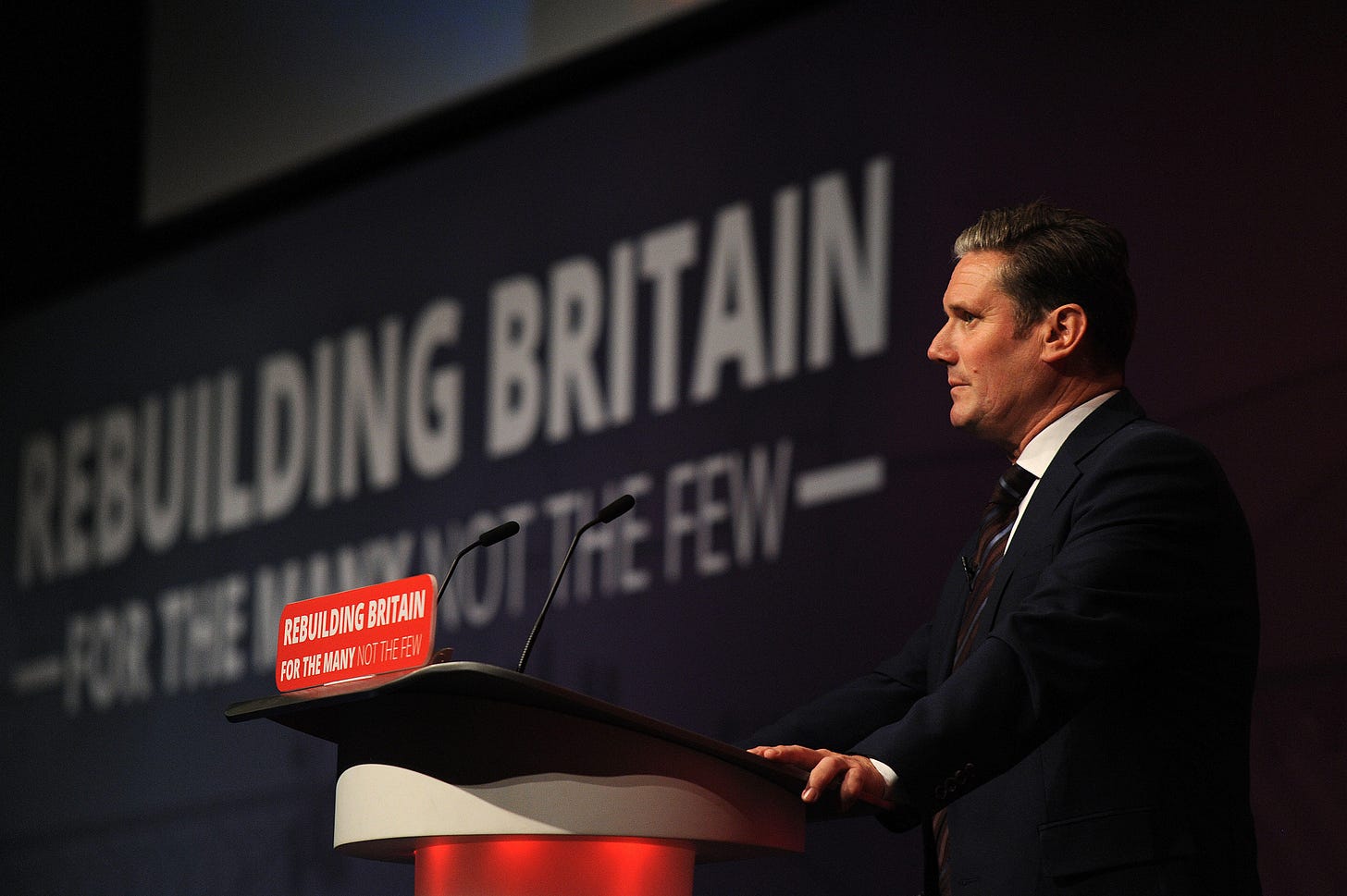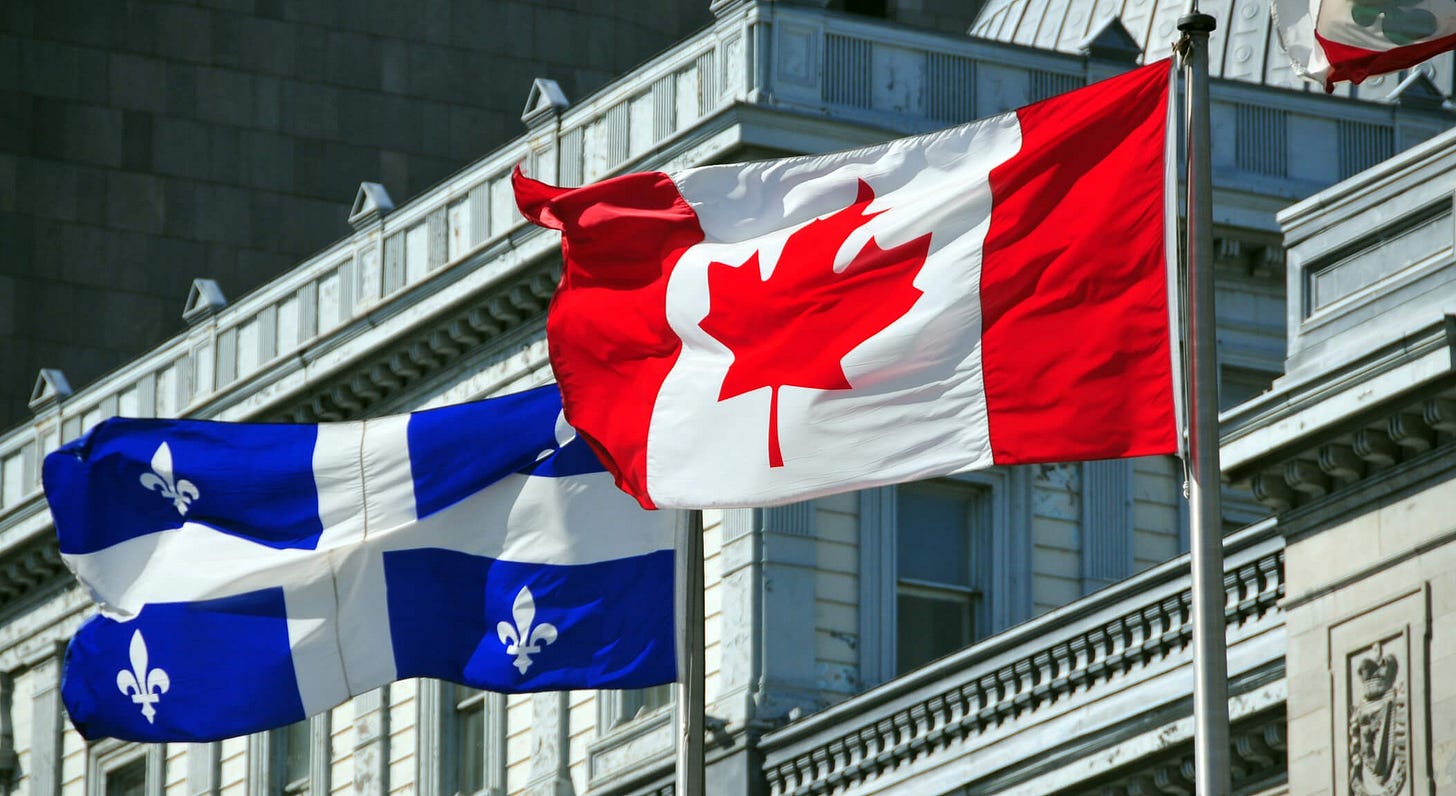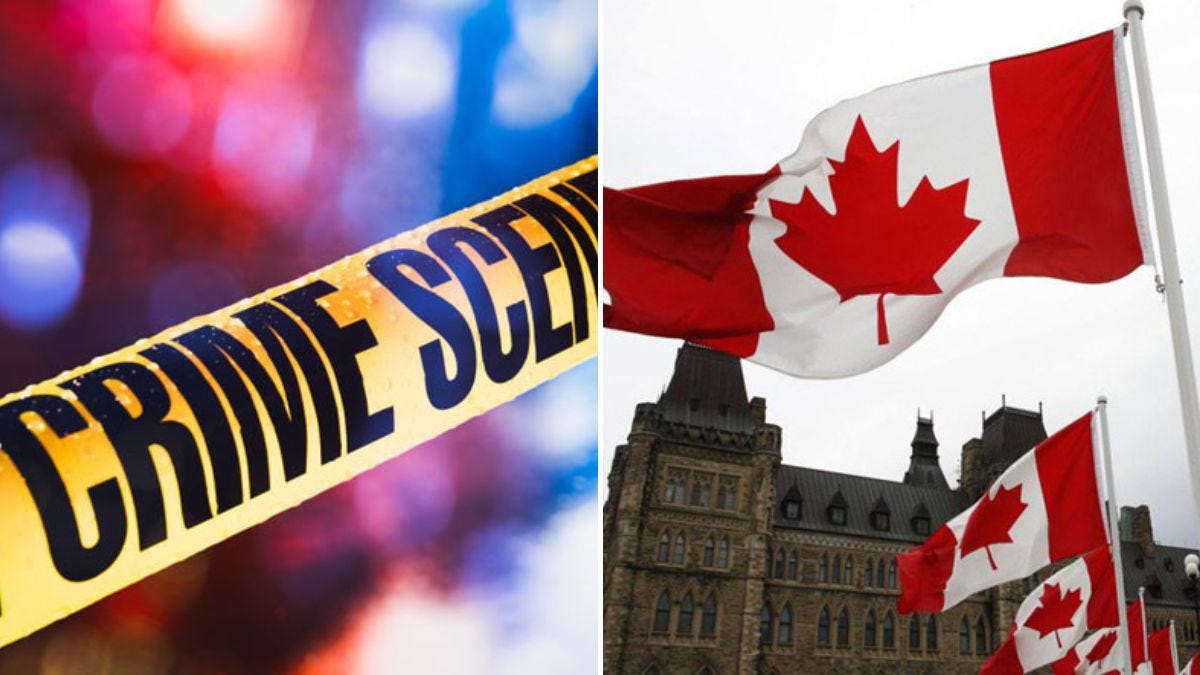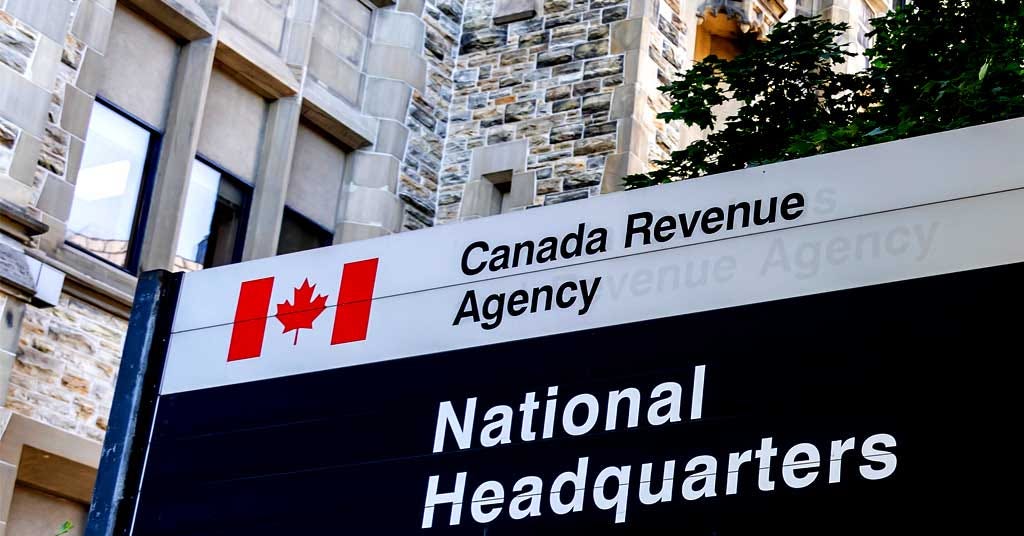Good morning, it’s Wednesday, September 3rd. In today’s news, The UK is becoming a cautionary tale for the Western World, Quebec rejects Canada’s race-based justice funding, Why US officials say Canada has become a haven for cartels, Six candidates from Germany’s right-wing AfD Party die 13 days apart in lead-up to elections, and much more.
First time reading the daily blend? Sign up here.
The UK Is Becoming a Cautionary Tale for the Western World
The United Kingdom, once regarded as the cradle of parliamentary democracy and individual liberty, is quickly sliding into totalitarianism with digital IDs, ideological arrests, censorship, and a suffocating hostility to free speech.
Sir Keir Starmer’s government is openly considering the introduction of mandatory digital ID cards for every citizen. Ministers admit the debate has shifted: “ministers believe such opposition has fallen away in recent years, as concern has grown over the number of small boat crossings.” In other words, a manufactured crisis is now the justification for stripping citizens of their anonymity. For years, so-called “conspiracy theorists” warned that western governments were allowing such crises to spiral out of control precisely to trojan horse totalitarian systems. The formula is as old as politics itself: permit chaos, allow society to be overwhelmed, then offer “order” in the form of state control. Citizens, exhausted and afraid, end up begging for their own chains.
But the descent isn’t confined to surveillance. It extends to ideological enforcement. Graham Linehan, the Irish comedy writer and long-time critic of gender ideology, was arrested at Heathrow Airport upon returning to the UK. Five armed officers awaited him. His crime? Tweets critical of men invading women’s spaces. His account of the ordeal is chilling:
“I was arrested at an airport like a terrorist, locked in a cell like a criminal, taken to hospital because the stress nearly killed me, and banned from speaking online—all because I made jokes that upset some psychotic crossdressers. To me, this proves one thing beyond doubt: the UK has become a country that is hostile to freedom of speech, hostile to women, and far too accommodating to the demands of violent, entitled, abusive men who have turned the police into their personal goon squad.”
This is not hyperbole. It is the reality of a society where police resources are diverted from fighting violent crime to silencing dissent. Where speech itself is treated as a criminal offence if it offends the ruling ideology. Where the state no longer protects the people, but protects narratives.
A free society cannot survive when governments criminalize jokes, normalize censorship, and reduce citizens to data points on a digital ledger. Britain’s experiment is becoming a warning to the world: liberty is rarely extinguished in one dramatic blow. More often, it is chipped away under the banners of safety, security, and “progress.” And once surrendered, it is seldom returned.
Quebec Rejects Canada’s Race-Based Justice Funding
The Liberal government in Ottawa is quietly rewriting the rules of justice, pouring millions of tax dollars ($16 million for now) into a program that tells judges to consider race before delivering a sentence. Instead of treating Canadians equally under the law, the feds are bankrolling “Impact of Race and Culture Assessments” (IRCAs), reports that push courts to hand out lighter punishments if someone can claim disadvantage tied to their race or cultural background. This isn’t justice—it’s social engineering dressed up as compassion.
Quebec, to its credit, isn’t buying it. The province has flat-out refused to accept a cent of this funding because it doesn’t subscribe to Ottawa’s narrative that Canada’s justice system is “systemically racist.” And they’re right to resist. As Quebec’s own anti-racism minister Christopher Skeete pointed out, this scheme creates two classes of citizens: those who get a sentencing discount because of their race and those who don’t. That’s not fixing inequality—it’s institutionalizing it.
For those of you wondering if your province or territory has signed on to this rather insane program, here are the jurisdictions that have agreements in place and are receiving IRCA funding to pass race-based judgements:
Alberta (agreement suspended in December 2024)
British Columbia
Manitoba
Nova Scotia
Newfoundland and Labrador
Ontario
The Liberals defend this nonsense as a step toward “equity,” but what it really does is undermine fairness, insult victims, and corrode the principle that justice should be blind. Quebec is drawing the line while Ottawa doubles down on a preposterous, enabling, and ultimately racist strategy that divides Canadians rather than unites them.
Why U.S. Officials Say Canada Has Become a Haven for Cartels
Canada is losing the fight against organized crime—and not by accident. For years, the RCMP has stonewalled cooperation with U.S. agencies, allowing Mexican cartels to turn Canadian trucking corridors into pipelines for cocaine, meth, and fentanyl. The result is an unrelenting flow of narcotics into our cities, while prosecutions collapse and cartels grow stronger.
Six years ago, U.S. officials pleaded with Canada to jointly target commercial trucking networks ferrying drugs from Mexico into the United States, then north across the Canadian border. The RCMP refused. Instead, Canadian police often let shipments roll through, hoping for arrests on Canadian soil. But in our courts, major prosecutions rarely survive. Two landmark cases—Project Brisa in Ontario and Project Cobra in Alberta—saw record-breaking seizures and press conferences collapse into nothing. Within two years, all charges were stayed. Suspects walked free. Millions of taxpayer dollars were wasted. The trucks and cash were even returned.
Why? Canada’s legal structure practically guarantees failure. The Jordan ruling forces strict timelines for trials, overwhelming prosecutors in complex cases. The Stinchcombe ruling compels disclosure of nearly all investigative material, often exposing sensitive police methods. Defence lawyers weaponize both, while Canadian authorities, risk-averse and politically cautious, retreat instead of reform.
Meanwhile, the cartels adapt. Tractor-trailers with hidden hydraulic traps move hundreds of kilograms per trip. Indo-Canadian trucking firms dominate these corridors, yet Canadian law enforcement refuses to coordinate with U.S. agencies who have the stronger laws and resources to dismantle such networks. American officials are left baffled: “You just spent $5 million on an investigation that resulted in nothing. How do you take responsibility for that?”
This isn’t just incompetence—it’s systemic rot. Former DEA chief Derek Maltz points to deeper vulnerabilities: Chinese money laundering saturating Canada’s financial system, porous borders, and “soft-on-crime” policies. Together, these create the perfect environment for cartels to thrive.
The pattern is clear: high-profile busts, collapsing trials, and cartels emboldened. Canada’s refusal to confront its legal and policing failures has left the country a haven for transnational crime. While ordinary Canadians face scrutiny for bank transfers and tax filings, cartel trucks roll across the border by the tonne.
This is not merely a law enforcement problem. It’s a national security crisis—and one Canada’s leaders seem unwilling to face. Source.
Six Candidates from Germany’s Rightwing AfD Party Die 13 Days Apart in Lead up to Elections
In a bizarre and unsettling turn ahead of Germany’s September 14 elections, four AfD candidates and two reserve members in North Rhine-Westphalia died within just 13 days. Officials have reported no foul play, but the unusual cluster has forced multiple ballot reprints and invalidated some mail-in votes. AfD co-leader Alice Weidel fueled speculation by highlighting claims that the string of deaths was “statistically impossible,” leaving many questioning how one party could suffer such a devastating blow so close to the polls. More
It’s crucial to note, the AfD party has surged in popularity, recently reaching the top of the polls, even though the sitting government tried to ban it.
Report: Bullying, Poverty, and Mental Illness on the Rise Among Canadian Youth
A new Raising Canada report warns that bullying, poverty, and mental illness are worsening among Canadian youth, calling it “a generation at risk.” More than 70% of teens reported being bullied in the past year, one in five experienced cyberbullying, and 1.4 million children were living in poverty by the end of 2024—the highest level since 2017. The report urges Ottawa to create a national strategy for children and appoint a commissioner to hold leaders accountable, as kids face growing challenges from social media, economic hardship, and lack of adequate support. More
ICE Granted Access to Spy Tool That Can Hack Phones and Read Private Messages - Paragon’s technology is designed to hack into mobile phones and secretly record messages sent using encrypted apps such as Signal and WhatsApp. More
Alberta Rolls Out Digital Wallet to Replace Health Cards and Store Government Documents - A digital version of Albertans’ health care cards will be the first document available in a newly launched app called the “Alberta Wallet.” Critics were quick to note that “once your freedom depends on an app, it no longer belongs to you. It belongs to the state.” More
The NDP Leadership Search is Underway—and the Party is Limiting Signatures from Men - Prospective federal NDP leadership candidates will have to raise $100,000 and amass 500 signatures from members—most of which cannot come from “cisgender men.” More
US Forces Strike Suspected Drug Boat, Killing 11 Tren de Aragua Gang Members - More
Indonesia is Overwhelmed With Violent Protests - At least seven have been killed as riots have swept across the country in recent days. Public anger erupted in Indonesia after it was revealed that all 580 lawmakers receive a monthly housing allowance of 50 million rupiah ($4,179 Cdn)—nearly 10 times Jakarta’s minimum wage—on top of their salaries. More
Putin Hails ‘Unprecedentedly High’ Relations with China as Gazprom Says It Signed New Long-Term Gas Deal - More
Ottawa Sets 100-Day Timeline to Fix CRA Call Centre Delays
Federal Finance Minister François-Philippe Champagne announced a 100-day plan to tackle Canada Revenue Agency service delays, even as Ottawa pushes public service spending cuts. Canadians are facing call centre wait times of up to 3.5 hours, while the CRA workforce grew from under 44,000 in 2019 to nearly 59,000 in 2024. Despite this increase, Champagne’s plan may involve another hiring blitz or reallocating staff, piloting a call-scheduling system, and expanding digital filing options, as the Taxpayers’ Ombudsman reports the office is “swamped” with complaints, 24% of which relate to call centre access. More
Judge Rules Google Can Retain Chrome but Must End Exclusive Search Deals and Share Data with Competitors - More
Kraft Heinz to Split into Two Companies as Financial Struggles Mount - The spinoff comes a decade after the two companies merged in efforts to boost growth. More
Air Lease to Be Sold to Sumitomo-Led Group for $7.4 Billion - The deal will further consolidate the aircraft leasing industry, which controls more than half the world’s commercial fleet. More
Stanford Scientists Successfully Reverse Autism Symptoms in Mice
Stanford researchers have uncovered a potential pathway to reversing autism behaviours in mice by targeting overactivity in the reticular thalamic nucleus, a brain region that filters sensory signals between the thalamus and cortex. Using experimental drugs and neuromodulation techniques, the team was able to normalize behavior in mice, reducing seizures, sensory hypersensitivity, repetitive actions, and social deficits. The study, published in Science Advances, also highlights shared mechanisms between autism and epilepsy, raising hope that targeting this brain region could lead to effective treatments for autism spectrum disorders in humans. More
Study Finds Gas-Powered Cars Replaced Every 12 Years, While Electric Vehicles Are Renewed Every 3 - Highlighting papid turnover and environmental impact in EV market - More
AI Officiating is Coming to the NFL
The NFL is exploring AI and advanced tracking technology to reduce human error in officiating, beginning with eliminating the chain gang for first-down measurements this season. Using high-definition cameras and microchips in footballs, the league aims to precisely track ball placement and player movements, inspired by successful systems in tennis, soccer, and basketball. While full automation of subjective calls like pass interference remains unlikely, officials hope AI can handle objective tasks, speeding up the game and improving accuracy. The NFL is testing these innovations with input from the UFL, which has served as a proving ground for new officiating technology. More
Jon Jones Has Charges Dropped in Case Which He Was Accused of Fleeing the Scene of an Accident and Threatening a Police Officer - More
Disney to Pay $10 Million Fine in FTC Case for Mislabeling Videos on its YouTube Channels - More
Graham Linehan—Co-creator of Father Ted—Arrested at Heathrow Over His X Posts on Trans Issues - More
A Teen’s iPhone Called 911 by Itself After Severe Crash and Saved Her Life
Precocious Parrot Earns Guinness World Record for Identifying and Pairing a Dozen Colours
On This Day in 1939, World War II: Britain Declares War on Germany Following Its Invasion of Poland, Soon Joined by France, Canada, Australia, New Zealand, and South Africa


















